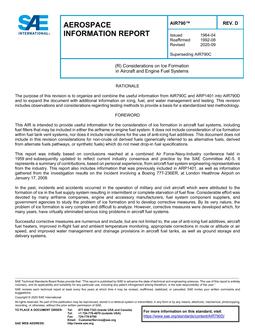Ice formation in aircraft fuel systems results from the presence of dissolved and undissolved water in the fuel. Dissolved water or water in solution with hydrocarbon fuels constitutes a relatively small part of the total water potential in a particular system with the quantity dissolved being primarily dependent on the fuel temperature and the water solubility characteristics of the fuel. One condition of undissolved water is entrained water, such as water particles suspended in the fuel as a result of mechanical agitation of free water or conversion of dissolved water through temperature reduction. This can be considered as analogous to an emulsion state. Another condition of undissolved water is free water which may be introduced as a result of refueling or the settling of entrained water which collects at the bottom of a fuel tank in easily detectable quantities separated by a continuous interface from the fuel above. Water may also be introduced as a result of condensation from air entering a fuel tank through the vent system. Assuming good quality of uplifted fuel, vapor passing through the aircraft vent system is a significant water introduction mechanism.
Product Details
- Published:
- 09/18/2020
- File Size:
- 1 file , 320 KB
